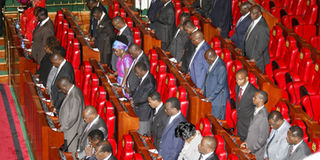MPs frustrate debate on Sh58bn mini budget

MPs in the newly refurbished Chambers during the official opening at Parliament Buildings August 7, 2012. Backbench MPs on January 3, 2013 frustrated debate on the Sh58billion Supplementary Budget Estimates after disagreeing with Finance minister Njeru Githae on the appropriate allocation for the establishment of county governments.
What you need to know:
IN FIGURES:
- Sh32 billion to meet increased pay for teachers, lecturers, health workers and police.
- Sh3.2bn towards construction of counties headquarters.
- Sh6.7bn goes to the Independent Electoral and Boundaries Commission (IEBC).
- Sh7.2bn allocated to Kenya Defence Forces for Operation Linda Nchi.
- Sh2 billion for the Kenya Revenue Authority
- Sh1.4 billion for Constitutional reforms and transitional expenses.
- Sh1.4 billion to treat terror attack victims.
- Sh5 billion to cater for a run-off after the General Election.
- Sh30.7 billion to meet government obligations.
Backbench MPs on Thursday frustrated debate on the Sh58billion Supplementary Budget Estimates after disagreeing with Finance minister Njeru Githae on the appropriate allocation for the establishment of county governments.
The MPs made history by frustrating debate on the motion protected by Parliament’s Standing Orders, which state that deliberations on a motion of that nature cannot be stopped or interrupted.
The morning session lasted hardly an hour, with the MPs leading a walk-out that forced an adjournment of proceedings and therefore suspending debate on the estimates.
It led Deputy Speaker Farah Maalim to declare that by failing to allow the withdrawal of the money from the Consolidated Fund, MPs were leading Kenya towards the “fiscal cliff” similar to the situation in the US, which was averted.
“We can easily have a fiscal cliff here and plunge this country into misery of un-proportional levels and magnitude,” said Mr Maalim as he urged Mr Githae to consult with Attorney General Githu Muigai.
Mr Farah said the shooting down of a bill on finance would result in the shutting down of the entire government.
With MPs insisting that the estimates were in breach of the Constitution, Mr Farah said: “We have a situation here where we are damned if we do and damned if we don’t.”
Defer debate
Prof Muigai had asked Mr Githae to have the motion to debate the estimates deferred to 2 pm.
But according to the rules, debate on the Supplementary Estimates can only be interrupted if the Speaker says so or if there are less than 30 MPs in the 222-member House.
Soon after debate resumed, MPs walked out and Migori MP John Pesa notified the Speaker of the lack of quorum.
The MPs united to stop the process soon after Mr Githae said the 47 county governments would not be allocated any funds for development between their establishment in March and the start of the next financial year in June.
Mr Githae told the House Sh10 billion had been allocated for the administration and establishment of county governments. Sh6.8 billion would be required between March and June.
He said there would be no allocation for development in the counties and the governments would only pay salaries for governors and their deputies, the county executive, their staff plus the purchase and fuelling of vehicles.
Mr Githae said this was based on advice from the Transitional Authority, which was set to receive Sh1.4 billion to enable it work between now and the establishment of the devolved governments.
But the tide began to turn soon after Chepalungu MP hesitantly seconded the motion. MPs baulked at the idea that employees in the devolved governments would be employed to simply earn their salaries and do nothing more for four months.
Dujis MP Aden Duale said that based on calculations on the last Budget, county governments should have been allocated at least Sh30 billion in the last quarter of the 2012/2013 financial year.
Fully operational
Mr Duale asked Mr Githae to give MPs the opinion of the Commission on Revenue Allocation on the matter, failure to which they would refuse. According to Mr Githae, CRA says the county governments should be fully operational after July 2013.
There was no shortage of supporters, with MPs Martin Ogindo (Rangwe), Gitobu Imanyara (Imenti Central), Danson Mungatana (Garsen) and William Kabogo (Juja) lining up to shoot down the motion.
They based their argument on the Constitutional provision that at least 15 per cent of national revenue should be allocated to devolved governments.
In his defence, Mr Githae said the President had approved the idea and that three bills to provide for the division and appropriation of money in the counties have been published.
With the County Allocation, Division of Revenue and County Appropriation bills in the pipeline, he said, MPs were jumping the gun by asking for the allocation beforehand.
He said in one of these, he had actually set the allocation at 33 per cent, way higher than that prescribed in the Supreme Law.
But the MPs insisted that the minister was pursuing an idea that would result in the stifling of county governments even before they are established. They said he had even delayed the publication of the three bills.
“The era of a rubberstamp Parliament is behind us,” said Mr Imanayara, “and it cannot be proper for a minister to come and ask us to pass a motion on the promise of publishing a bill.”
Mr Ogindo said: “The allocation to county governments is not negotiable. If that doesn’t happen, then the House would not pass the Estimates.”
“I’ll be a governor in Kiambu and I don’t want to go there and sit and wait for a salary. There’ll be nothing to do for a quarter of a year. Let the minister withdraw this for the rest of the day, go consult and conform with the Constitution," said Mr Kabogo.




